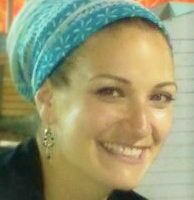Ahuva Wisebrod
Credentials
Finances
Licensed in Israel
- Tarshish
- Modiin
Ahuva Wisebrod
 Verified
Verified
Credentials
Clinical Social Worker
MSW
Finances
350-500 NIS
N/A
Free Consultation
ABOUT THE THERAPIST
I've been a therapist for teens and young adults (ages 13-40+) for over 13 years. I have helped hundreds of clients deal with issues of depression/anxiety, OCD, phobias, trauma, self-esteem, family issues, social issues, and more. I am trained in psychodynamic, CBT, and DBT therapeutic styles, which I integrate as required, to best suit an individual client's needs. Whether there is a specific diagnosed problem, or a general desire to live a better life, I work with each client to create a safe place where they can explore their thoughts, feelings, and experiences in order to gain better self-understanding, and learn the tools and skills that they need in order to feel better.
It is not always an easy or simple process. But with patience and perseverance, wonderful, hard-to-believe-it-could-ever-happen changes do occur. As I tell each of my clients, in the very beginning, it is much easier for me to believe in this end goal because I've had the privilege of being a part of many similar journeys. I look forward to more of these "journeys", helping clients heal, grow, and thrive.
QUALIFICATIONS
MSW
Wurzweiler School of Social Work
2005
Degree
MSWEducation
Wurzweiler School of Social WorkYear of Graduation
2005Years in Practice
19
Registered Social Worker in Israel
27632
ADDITIONAL CREDENTIALS
2013 -Training Course for Therapists: Sexual Trauma in Children
Meital: Treatment Unit for Sexually Abused Children and Teens, Bayit Lekol Yeled, Jerusalem.
2012 - Cognitive Behavioral Therapy (CBT) Training Course. Department of Psychiatry,
Hadassah Hospital, Ein Kerem, Jerusalem. 2 year course, including internship at hospital.
DISTANCE COUNSELING
Telephone Counseling, Online Therapy
PRIMARY SPECIALTIES
Anxiety / Panic
Family Issues
Life Transitions
Obsessive Compulsive Disorder (OCD)
Trauma / Post Traumatic Stress Disorder PTSD
ADDITIONAL SPECIALTIES
Abuse
Academic
Depression
Domestic Violence
Drug Abuse
Executive / Career / Life Coaching
Grief
Infertility
Phobias
Self-Esteem
Sexual Issues
Stress Management
CLIENT FOCUS
Population
Adolescents
Adults
Men
Women
Languages Spoken
Hebrew
English
TREATMENT APPROACH
Cognitive Behavioral Therapy (CBT)Cognitive Behavioral Therapy (CBT) is a type of psychotherapy that focuses on how one's thoughts, feelings and behaviors are connected and can be changed. It is based on the idea that how we think (cognition) and how we feel (emotion) can influence how we behave. CBT helps people identify and challenge distorted thinking and replace it with more balanced thinking, leading to improved mood and behavior. ‘Homework’, usually containing practical writing exercises, is often completed by the client between sessions to reinforce the therapy. Examples of tools that practitioners often use are journaling, challenging beliefs, and mindfulness.
Dialectical Behavior Therapy (DBT)Dialectical Behavior Therapy (DBT) is a type of cognitive-behavioral therapy developed by Marsha Linehan to help people learn to better manage and cope with emotions and stress. It focuses on developing skills and strategies to help regulate emotions, improve relationships and communication, and reduce self-destructive behaviors. Through DBT, people learn to identify and modify unhealthy thoughts and behaviors, while also learning to accept and validate their own feelings. DBT teaches skills to help individuals become aware of and accept and regulate their emotions, tolerate distress, and improve interpersonal relationships.
Mindfulness-Based Cognitive Therapy (MBCT)Mindfulness-Based Cognitive Therapy (MBCT) is a form of therapy that combines cognitive behavioral therapy with mindfulness practices. It is based on the idea that our thoughts, emotions, and physical sensations can affect our mental health. MBCT helps individuals become aware of their thoughts, emotions, and physical sensations in order to gain insight and control over them. MBCT helps clients learn how to recognize their sense of being and see themselves as separate from their thoughts and moods. This separation can free the client from thought patterns in which the repeated negative messages may be dominating the client’s focus. After developing an awareness of the separation between thoughts, emotions, and the self, people in treatment may find that while the self and the emotions may exist simultaneously, they do not have to exist within the same dimension. The healing can take place when one learns how to interject positive thoughts into negative moods and thereby create a shift in mood.
Psychodynamic TherapyPsychodynamic therapy is a form of therapy that focuses on the unconscious mind and how it affects behavior. It works to help people understand and work through past experiences and feelings that may be causing difficulties in the present. This type of therapy encourages individuals to explore their emotions, relationships, and behaviors in order to gain insight into their current difficulties. It can help individuals better understand themselves and their motivations, and gain insight into how past events have impacted their current lives. People tend to develop defense mechanisms when faced with challenges in life. Defense mechanisms may keep painful feelings, memories, and experiences in the unconscious. A few common defense mechanisms include: denial, repression, and rationalization. Psychodynamic therapists encourage people to speak freely about their emotions, desires, and fears. Being open may help uncover vulnerable feelings that have been pushed out of conscious awareness. According to psychodynamic theory, behavior is influenced by unconscious thought. Once painful feelings are brought forth and processed, the defense mechanisms are no longer needed and a person in treatment can start changing unhelpful patterns when coping with life’s challenges.
Mindfulness
SERVICES OFFERED
Individual Therapy

 Verified
Verified

